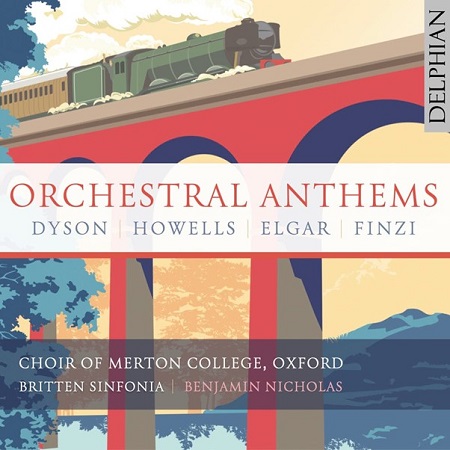Christmas, Easter and specific feast days or celebrations provide opportunities for cathedrals and large parish churches with the necessary resources to perform liturgical works with orchestral accompaniment. All the music on this excellent disc from Delphian, usually performed with organ accompaniment, is clothed in orchestral colours. And what a rare treat it is to hear these familiar works so transformed by the Choir of Merton College, Oxford in collaboration with the Britten Sinfonia. Under Merton’s Director of Music Ben Nicholas, Delphian has produced a richly rewarding selection of works by English composers mostly from the first half of the twentieth century.
Two of the works recorded here began life in orchestral form, while the remainder have in their various ways each been repurposed subsequent to their original conception. Of the pre-existing versions, Howells’ Behold, O God our defender was written for the 1953 coronation of Elizabeth II (where some 400 singers were accompanied by sixty orchestral players), while Elgar’s The Spirit of the Lord (the Prologue to The Apostles) was premiered at the 1903 Birmingham Festival. Notwithstanding a performance at this year’s Three Choirs Festival in Gloucester, the oratorio is less often performed nowadays, and the work’s atmospheric opening movement is more likely to be heard as a standalone concert item or as an anthem in a church service.

It was at another Three Choirs Festival performance that the orchestral version of Finzi’s Lo, the full,final sacrifice was first heard in 1947 at Worcester Cathedral. This substantial anthem had been conceived a year earlier for the Patronal Festival of St Matthew’s Northampton, a commission from the Rev. Walter Hussey who five years earlier had prompted Britten’s Rejoice in the Lamb, itself later orchestrated by Imogen Holst for the 1952 Aldeburgh Festival. Finzi fashioned his own orchestration for his anthem, as he was to do for his non-liturgical Magnificat. The orchestral version of Lo, the full, final sacrifice is especially gratifying, hauntingly so in the solemn introduction where the poignant colouring of wind sonorities anticipate and heighten references within Richard Crashaw’s seventeenth-century text that largely focuses on the Last Supper. Just as Finzi demonstrates great sensitivity to his word setting, so he ‘translates’ the original organ part to a score that never intrudes on or distracts from the text, yet provides expressive solo opportunities for the players, only unleashing the full forces (including timpani and percussion) at moments of exultation.
In 1929, Elgar had been asked to write something ‘significant’ for the Worcester Three Choir’s Festival, but the hoped-for completion of his projected trilogy begun thirty years earlier with The Apostles and The Kingdom failed to materialise. Instead, Elgar produced a full orchestral arrangement of Purcell’s motet Jehova, quam multi sunt hostes mei. On first hearing, Elgar’s version sounds distinctly incongruous, a Baroque work of some intimacy with just continuo accompaniment now fleshed out in a manner reminiscent of one of Leopold Stokowski’s organ transcriptions of Bach. But there is no doubting the skill of the orchestration, and the brass writing brings echoes of Giovanni Gabrieli’s motets a century before Purcell. The singing from the Merton choir and two soloists, Ruari Bowen and William Thomas, is outstanding.
There’s more Elgar to be heard in his motet Ecce sacerdos magnus, a work of great dignity written to markthe visitation of a catholic archbishop to St George’s Church, Worcester in 1888 and orchestrated five years later for performance in Birmingham for a similarly important occasion. It’s a work that can manage to sound dull if a sense of forward movement is missing, but happily this is not the case here.
A grander occasion was the stimulus for Vaughan Williams’ Te Deum in G, written in 1928 for the enthronement of Dr. C.G. Lang as Archbishop to Canterbury Cathedral. Arnold Foster’s orchestration undoubtedly enhances the work’s majesty, although the work’s unyielding quality remains. More satisfying, at least for this listener, is Bairstow’s modestly scored Blessed city, heavenly Salem where just strings and piano bring both warmth and dramatic impact to the text’s celestial vision. Written in 1913 for the combined choirs of All Saints’ and Heaton parish churches in Bradford, this celebratory anthem is a favourite amongst church choirs and, judging from this ardent performance, is clearly much loved by the singers at Merton. The declamatory string opening is superbly done, the sopranos are angelic and passionate and the soloist, Áine Smith, has a lovely bloom to her tone.
For me, the most uplifting account on this disc comes from Dyson’s 1907 Evening Service in D which was orchestrated for the Festival of the Sons of the Clergy at St Paul’s Cathedral in 1935 and is here recorded for the first time. The Merton choir seem to be singing with an unbridled excitement. I can almost picture Benjamin Nicholas trying to contain his forces, such is the excitement generated. If the tempo of the ‘Magnificat’ is just a tad fast, there is a tremendous excitement in the build up to the ‘Gloria’, timpani and brass adding drama and the consequent tension and release is magnificent.
Altogether, this is a thoroughly uplifting disc revealing enterprise, scrupulous preparation and a superb collaboration between the combined choral and orchestral forces. A pity the duration is under an hour, and the scoring not shown for each work, but the sound quality is excellent, the CD liner notes authoritative and the musicianship first class. In short, not to be missed.
David Truslove
Bairstow – Blessed city, heavenly Salem, Elgar – Ecce sacerdos magnus, Dyson – Evening Canticles in D, Howells – Behold, O God our defender, Purcell (orch. Elgar) – Jehova, quam multi sunt hostes mei, Finzi – Lo, the full, final sacrifice, Vaughan Williams – Te Deum in G, Elgar – The Spirit of the Lord
Choir of Merton College, Oxford; Girl Choristers of Merton College, Oxford; Britten Sinfonia; Áine Smith (soprano), Ruari Bowen (tenor), William Thomas (bass), Benjamin Nicholas (conductor)
Delphian DCD 34291 [55:08]